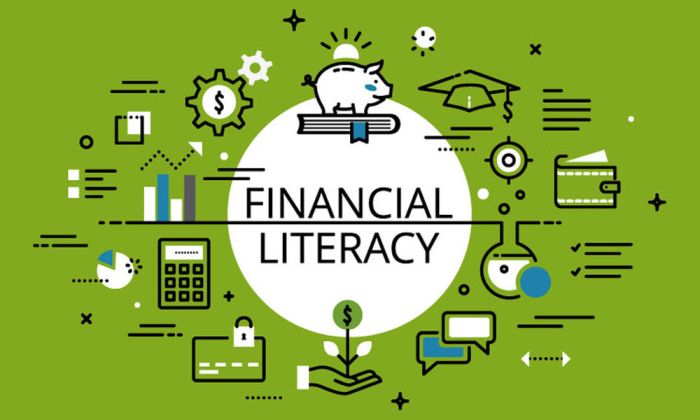Get ready to dive into the world of financial literacy where knowledge is power and financial freedom is the ultimate goal. From budgeting to investing, this topic is your ticket to making informed decisions and securing your financial future.
Exploring the basics and strategies of financial literacy will empower you to take control of your finances and pave the way for a brighter tomorrow.
Importance of Financial Literacy
Financial literacy is like the secret sauce for navigating the crazy world of money, makin’ sure you don’t end up broke or in debt up to your eyeballs. It’s all about understanding how money works, makin’ smart choices, and plannin’ for the future like a boss.
Smart Decision Making
- With financial literacy, you can make informed decisions about saving, investing, and spending, helpin’ you reach your goals faster than you can say “dollar bills.”
- Understanding interest rates and credit scores can help you avoid high debt and secure better loans when you need ‘em most.
Key Benefits
- Being financially literate gives you the power to take control of your financial future, instead of lettin’ money control you.
- It can lead to financial independence, helpin’ you build wealth and achieve those big dreams you’ve been hustlin’ for.
Basic Concepts of Financial Literacy
Financial literacy refers to the knowledge and understanding of financial concepts that are essential for making informed decisions about personal finances. It involves managing money effectively, creating budgets, saving for the future, investing wisely, and managing debt responsibly.
Budgeting
Budgeting is the process of creating a plan for how you will spend your money. It involves tracking your income and expenses to ensure that you are living within your means. By creating a budget, you can prioritize your spending, identify areas where you can cut back, and allocate funds towards savings and investments.
Saving
Saving involves setting aside a portion of your income for future needs or emergencies. It is important to have an emergency fund to cover unexpected expenses and to save for long-term goals such as buying a home or retirement. Saving allows you to build financial security and stability over time.
Investing
Investing is the process of putting your money into financial assets with the expectation of earning a return. This can include stocks, bonds, mutual funds, real estate, and other investment opportunities. Investing allows your money to grow over time and can help you achieve your long-term financial goals.
Debt Management
Debt management involves responsibly borrowing money and managing existing debts. It is important to understand the terms of any loans or credit agreements, make timely payments, and avoid accumulating high-interest debt. By managing debt effectively, you can maintain a good credit score and avoid financial stress.
Strategies for Improving Financial Literacy
Improving financial literacy is crucial for making informed decisions about money matters. By enhancing financial literacy skills, individuals can better manage their finances, plan for the future, and avoid common financial pitfalls.
Utilize Financial Education Programs or Resources
Financial education programs or resources play a vital role in enhancing financial literacy. These programs provide valuable information on budgeting, saving, investing, and managing debt. By participating in workshops, seminars, or online courses, individuals can gain the knowledge and skills needed to make sound financial decisions.
- Attend workshops or seminars offered by financial institutions or community organizations.
- Take advantage of online resources such as financial literacy websites, podcasts, and videos.
- Read books or articles on personal finance to deepen your understanding of key financial concepts.
Educate Yourself About Financial Matters
Self-education is another effective way to improve financial literacy. By taking the initiative to learn about various financial topics, individuals can empower themselves to make informed choices and take control of their financial future.
Knowledge is power when it comes to managing your money effectively.
- Start by creating a budget to track your income and expenses.
- Learn about different investment options and strategies to grow your wealth.
- Understand the basics of credit and debt management to avoid financial pitfalls.
Challenges in Achieving Financial Literacy

Financial literacy is crucial for making informed decisions about money management, investments, and savings. However, there are several challenges that hinder individuals from achieving a high level of financial literacy. These obstacles can stem from personal, societal, or educational factors. Let’s explore some of the common challenges and ways to overcome them.
Personal Barriers
One of the main personal barriers to financial literacy is a lack of motivation or interest in learning about financial concepts. Some individuals may find topics like budgeting, investing, or retirement planning overwhelming or boring, leading to a disinterest in improving their financial knowledge.
Additionally, limited exposure to financial education or resources at a young age can also contribute to low levels of financial literacy. Without early exposure to basic financial concepts, individuals may struggle to understand complex financial topics later in life.
Societal Factors
Societal factors such as income inequality, cultural beliefs, and access to financial resources can also impact an individual’s financial literacy. Lower-income households may face greater challenges in building financial literacy due to limited access to quality education, financial services, or resources.
Cultural beliefs around money and financial management can also influence an individual’s attitudes and behaviors towards money. For example, cultures that prioritize saving over investing may miss out on opportunities to grow wealth through investments.
Educational System
The lack of standardized financial education in school curriculums is another significant challenge in achieving financial literacy. Many students graduate from high school without basic knowledge of financial concepts such as budgeting, saving, or investing, leaving them ill-prepared to make important financial decisions in adulthood.
Addressing these challenges requires a collaborative effort from individuals, educational institutions, policymakers, and the financial industry. By promoting financial literacy through early education, accessible resources, and community programs, we can empower individuals to make informed financial decisions and secure their financial futures.
